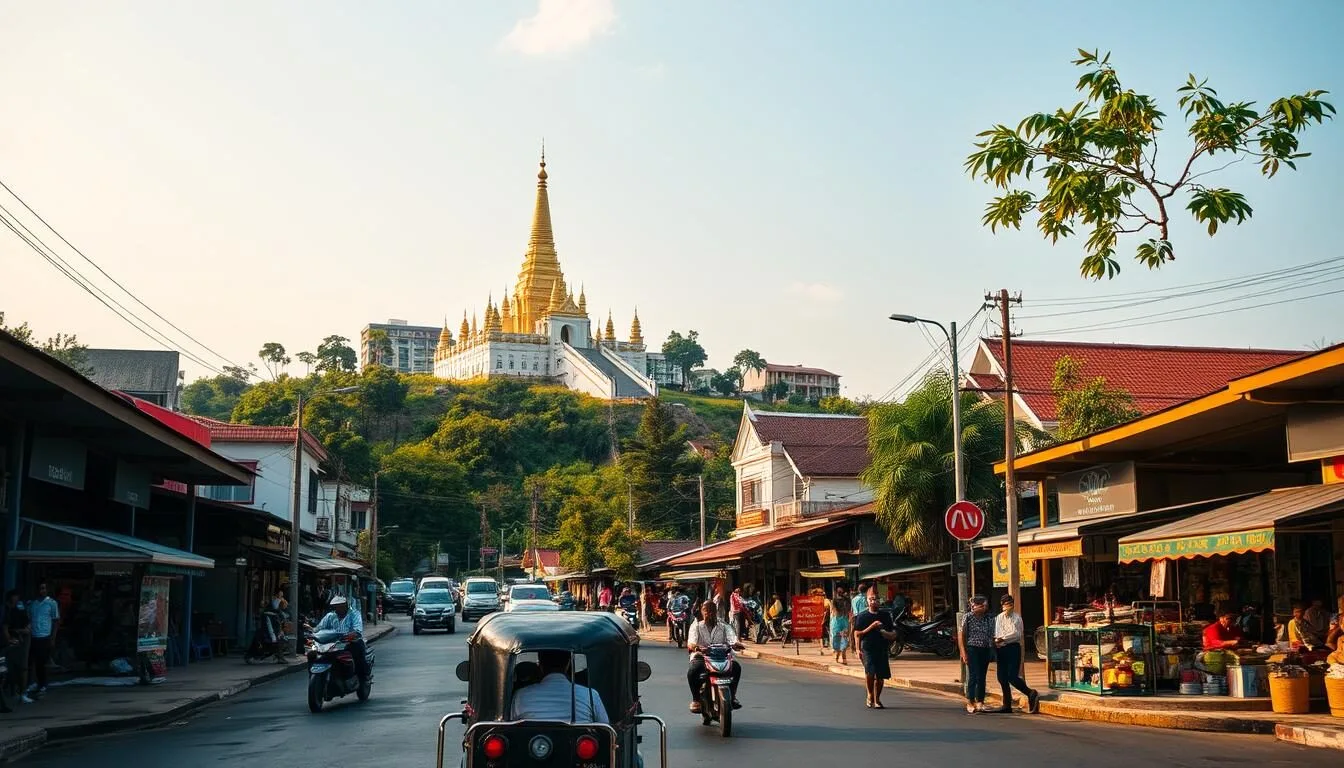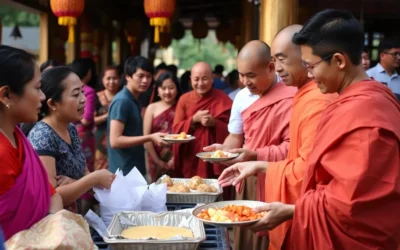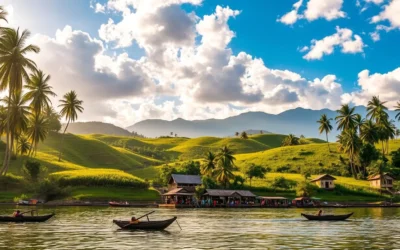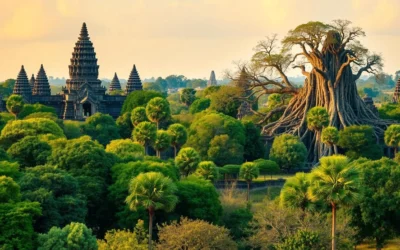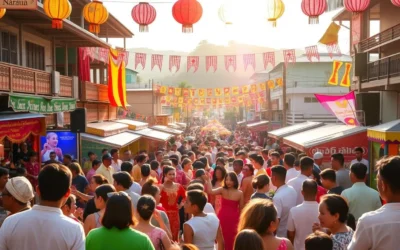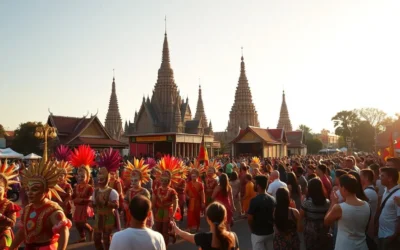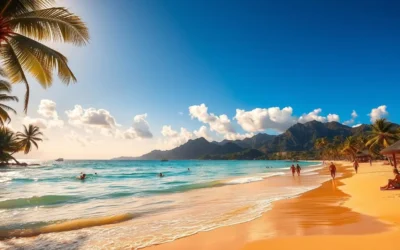✓ Accommodations✓ Flights✓ Rental Cars✓ Tours & Activities
Nestled along the serene Sangkae River in northwest Cambodia, Battambang is a hidden gem waiting to be explored. As the second-largest city in the country, it offers a unique blend of rural charm and urban convenience that is often overlooked by travelers.
You’ll discover a laid-back pace that’s perfect for those seeking an authentic experience in this charming riverside city. Whether you’re looking to explore ancient temples, vibrant markets, or take a ride on the famous bamboo train, this comprehensive guide will help you make the most of your visit.
With its tranquil atmosphere and rich cultural heritage, Battambang is an ideal stop on your journey between Phnom Penh and Siem Reap. Get ready to uncover the top picks and make unforgettable memories in this captivating place.
Discovering Battambang: Cambodia’s Hidden Gem
As you explore Cambodia, you’ll discover that Battambang is a hidden gem waiting to be uncovered. Located in the northwest of Cambodia, near the Thai border, Battambang is the third-largest city in the country and the capital of the Battambang Province.
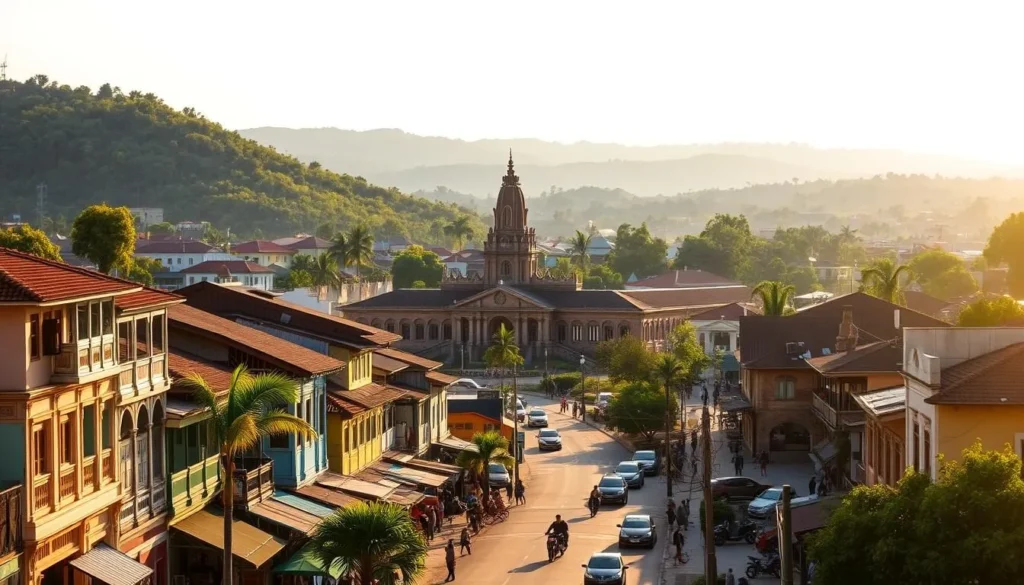
Battambang offers a unique blend of traditional culture and relaxed atmosphere, making it an ideal destination to visit. Unlike more touristy areas like Siem Reap, Battambang provides an authentic experience, with its well-preserved colonial architecture and local culture.
Why Visit Battambang
You should consider visiting Battambang because it offers a refreshing contrast to other major cities in Cambodia. The city serves as Cambodia’s rice bowl, surrounded by picturesque countryside that gives you a glimpse into traditional rural life. Battambang is also experiencing a cultural renaissance, with its artistic heritage being revived after the Khmer Rouge period.
| Reasons to Visit Battambang | Experiences to Expect |
|---|---|
| Authentic local culture | Explore colonial architecture and markets |
| Picturesque countryside | Visit rural villages and rice fields |
| Cultural renaissance | Discover local art and history |
How Many Days to Spend in Battambang
To fully experience Battambang, you should plan to spend at least two days here. One day is enough to explore the city center, with its colonial buildings and markets, while the second day allows you to venture into the surrounding countryside and enjoy the best things to do in Battambang.
In conclusion, Battambang is a city that has something to offer for everyone, from its rich history to its vibrant culture and stunning natural beauty. Make sure to include it in your Cambodia itinerary for a unique and unforgettable experience.
How to Get to Battambang
If you’re planning a trip to Battambang, you’ll be pleased to know that it’s easily accessible from various locations in Cambodia. The main mode of transportation in Cambodia is by bus, and you can easily buy bus tickets and search for routes using services like Bookaway or 12Go.
From Siem Reap to Battambang
The most economical way to travel from Siem Reap to Battambang is by bus, which takes around three hours and costs between $6-10 per person. For a more scenic journey, consider taking the ferry through Tonle Sap Lake, which takes about six hours but offers beautiful views of floating villages along the way.
From Phnom Penh to Battambang
From Phnom Penh, the bus journey to Battambang takes approximately five hours, with a rest stop where you can grab some local food and stretch your legs. This is the most convenient and affordable way to make the trip.
Getting Around Battambang
Once in Battambang, the city center is compact and easily walkable. However, to explore the surrounding attractions, you’ll need transportation. Renting a motorbike for about $8 per day gives you the flexibility to explore at your own pace. Alternatively, Tuk-tuks are readily available for day trips, with drivers typically charging $15-25 for a full day of sightseeing.
Ride the Famous Bamboo Train
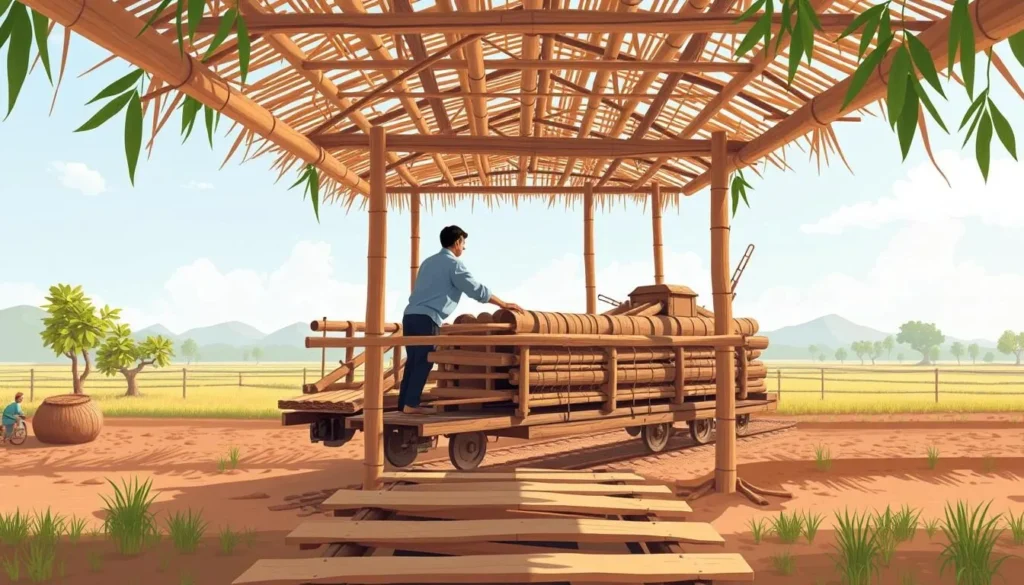
Battambang’s bamboo train offers a unique and exhilarating ride through the Cambodian countryside. The bamboo train, also known as a “norry,” is a simple bamboo platform mounted on train axles, powered by a small motor. This rustic yet thrilling experience allows you to zip along at speeds of up to 30 km/h.
What to Expect on the Bamboo Train
During your 20-minute journey on the bamboo train, you’ll glide through beautiful countryside scenery, passing rice fields and local villages that provide authentic glimpses of rural Cambodian life. The single-track system means that when two trains meet, the one with fewer passengers must be completely disassembled to let the other pass. This unique aspect adds to the excitement of your ride.
The original bamboo train experience has evolved over the years. Tourists are now directed to a shorter track built specifically for visitors, rather than the longer authentic route locals once used. Despite this change, the experience remains memorable and unique, showcasing Cambodia’s resourcefulness and ingenuity.
Tips for Visiting the Bamboo Train
To make the most of your visit, consider going in the morning when temperatures are cooler and there are typically fewer tourists. This allows for a more peaceful ride. Be prepared for local vendors at the end of the track, and don’t feel pressured to buy anything. The cost for the train ride is around $5-10, with the option to tip afterward.
Ensure you’re visiting the old bamboo railway, as it’s much more authentic than the new one. The old railway provides a genuine insight into how locals used to travel.
Explore Phnom Sampov: Bats and History
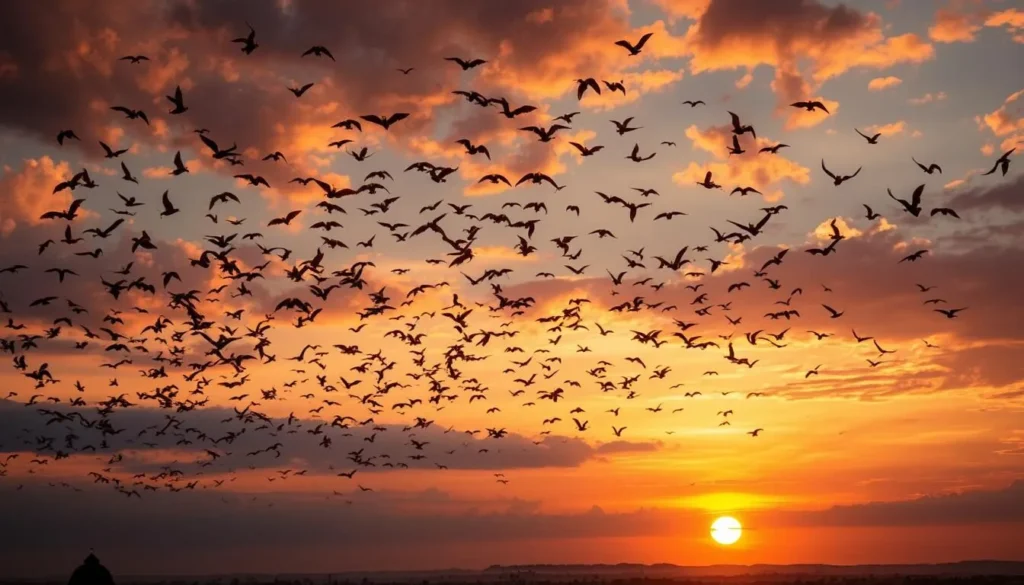
If you’re looking for a day trip from Battambang, Phnom Sampov is an excellent choice, offering a mix of history, stunning views, and an unforgettable bat-watching experience. Located about 12 kilometers southwest of Battambang city, Phnom Sampov is a mountain steeped in history and legend.
The Killing Caves: Understanding Cambodia’s Dark History
The Killing Caves at Phnom Sampov are a sobering reminder of Cambodia’s tragic past under the Khmer Rouge regime. Visitors can explore the caves where thousands of innocent people were executed and see the remains of the victims on display in a glass-covered cabin next to a Buddha statue. This poignant memorial provides a raw and less curated experience of Cambodia’s history, unlike the more developed killing fields near Phnom Penh.
Witness the Bat Exodus at Sunset
As the sun sets over the countryside, Phnom Sampov comes alive with millions of bats emerging from the caves in a continuous stream that can last for 30-40 minutes. You can sit back, relax with a cold drink from the local vendors, and witness this natural spectacle. The experience is truly breathtaking, with the bats heading off in all directions towards the rice paddies.
Combining your visit to the killing caves with the bat exodus creates a powerful juxtaposition of Cambodia’s painful history and natural beauty. The mountain also features Buddhist shrines and offers panoramic views of the surrounding countryside, making it worth arriving a few hours before sunset to explore fully.
Visit Ancient Temples Around Battambang
If you’re looking for a less crowded alternative to Angkor Wat, consider visiting the ancient temples near Battambang. The region is home to several historical sites that offer a glimpse into Cambodia’s rich cultural heritage.
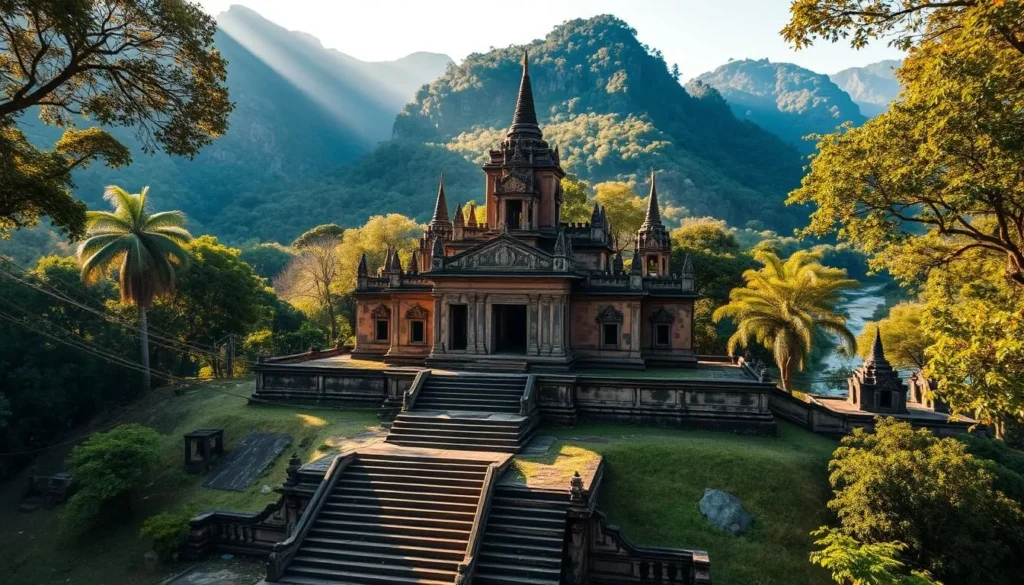
Banan Temple: The Mini Angkor Wat
Banan Temple, often referred to as “mini Angkor Wat,” is a 12th-century temple located about 27 km south of Battambang’s town center. To reach the temple, you’ll need to climb 358 steps up a hill, but the effort is rewarded with stunning views of the surrounding countryside and the five sandstone towers that make up the temple complex.
Key Features of Banan Temple:
| Feature | Description |
|---|---|
| Architecture | Similar to Angkor Wat, with intricate carvings and a central tower |
| Views | Panoramic views of the Sangker River, rice paddies, and villages |
| History | Built in the 12th century, showcasing ancient Khmer craftsmanship |
Wat Ek Phnom: Ancient Ruins and Modern Buddhism
Wat Ek Phnom is an 11th-century Hindu temple located about 13 km north of Battambang. The temple is known for its carved pediments and lintels, despite being partially collapsed. The site is also home to a modern Buddhist pagoda, featuring a gigantic white Buddha statue, which juxtaposes ancient ruins with modern religious practices.
Highlights of Wat Ek Phnom:
- Explore the partially collapsed temple and its carved stone structures
- Discover the modern Buddhist pagoda and its colorful decorations
- Experience the tranquility of the surrounding countryside
Both Banan Temple and Wat Ek Phnom offer unique insights into Cambodia’s history and culture, making them must-visit attractions when in Battambang.
Battambang, Cambodia: Best Things to Do in the City Center
In Battambang’s city center, the past and present merge in a fascinating mix of architecture, art, and daily life. As you stroll through the city, you’ll discover a unique blend of French colonial heritage and modern Cambodian culture.
Walking Tour of Colonial Architecture
A walking tour is one of the best ways to experience the charm of Battambang’s city center. Start your day early at the Central Market, also known as Psar Nat Market, which opens daily from 6 AM. This vibrant market is not only a great place to sample local food like kuy teav noodle soup but also to witness the bustling atmosphere as locals go about their daily shopping. The market’s Art Deco design, courtesy of the same French architect who designed Phnom Penh’s Central Market, is a highlight of the city’s architectural heritage.
As you continue your stroll, you’ll pass by numerous French colonial buildings, now repurposed into trendy cafes, artist-run galleries, and boutique shops. The city’s colonial-era buildings along the riverfront create a pleasant atmosphere for exploration. Be sure to visit the Governor’s Residence, a stunning example of French colonial architecture, and admire the historic Chinese shophouses with their ornate facades.
Explore the Central Market
The Central Market is the beating heart of Battambang, offering a sensory experience like no other. Arriving early (around 6-7 am) allows you to witness the market at its peak, with locals shopping for fresh produce and household goods. Take a moment to enjoy a traditional Cambodian breakfast at one of the little restaurants inside the market hall.
| Attraction | Description |
|---|---|
| Central Market | Vibrant market with Art Deco design, offering local food and goods |
| Governor’s Residence | Stunning example of French colonial architecture |
| French Colonial Buildings | Repurposed into cafes, galleries, and boutique shops |
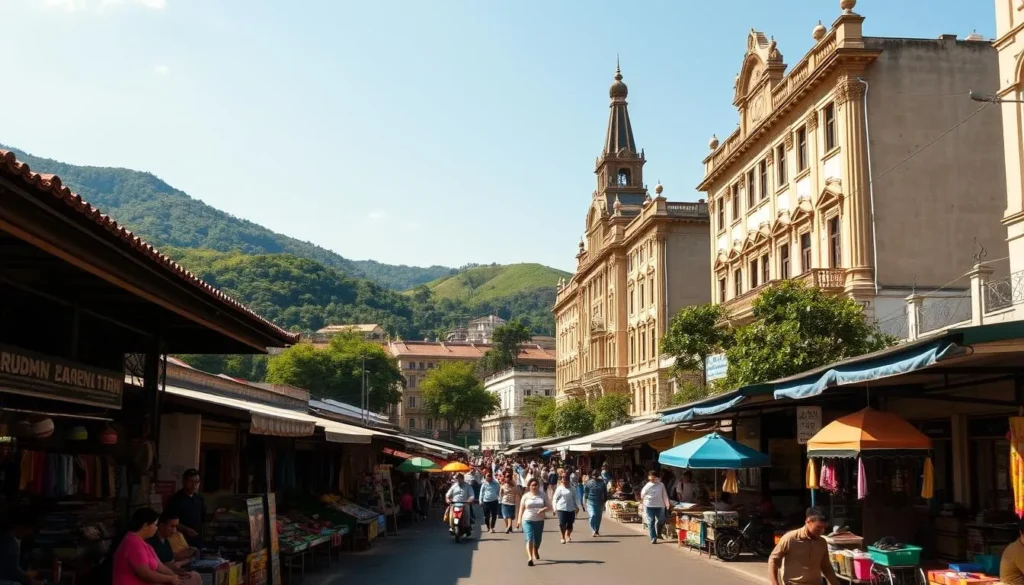
Battambang’s city center is a compact area that can be explored in half a day, leaving you time to visit the nearby countryside or relax at a riverside cafe to watch the sunset. The city’s art renaissance is evident in galleries like Romcheik5 Art Space, showcasing contemporary works by local artists who survived the Khmer Rouge era.
Unique Experiences in Battambang’s Countryside
Venturing into Battambang’s countryside reveals a world of traditional Khmer culture and breathtaking natural beauty. As you explore the rural landscapes, you’ll discover serene rice fields, charming villages, and authentic experiences that await your arrival.
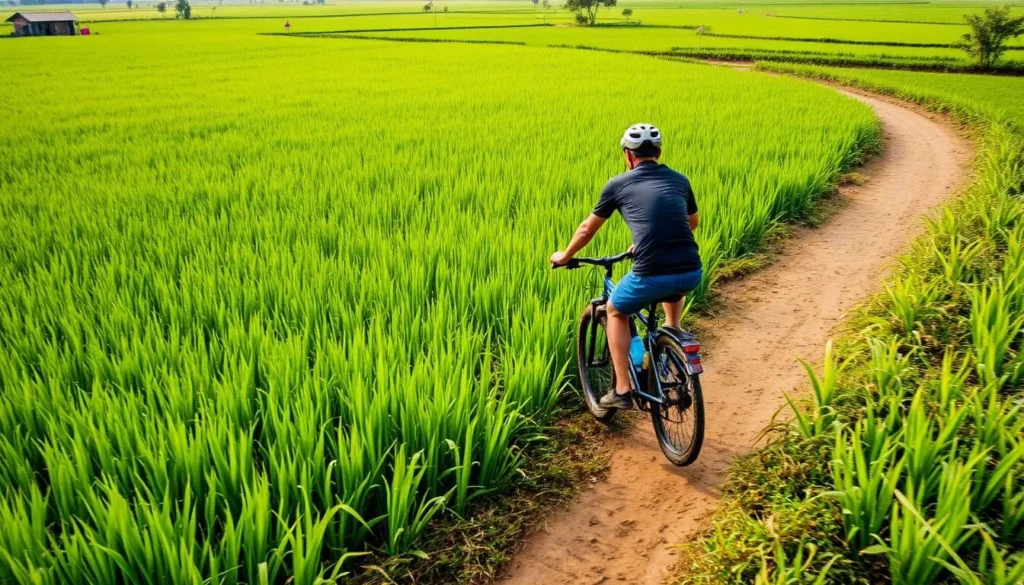
Cycling Through Rice Fields and Villages
Cycling is one of the best ways to experience Battambang’s countryside. With flat terrain making it accessible for riders of all fitness levels, you can pedal through rice paddies, past water buffalo, and alongside friendly locals. Several local tour companies offer guided cycling tours that take you to small-scale production sites where you can see traditional methods of making rice paper, rice wine, and bamboo sticky rice.
As you cycle through the countryside, you’ll have the opportunity to visit local industries and workshops, and even try your hand at making some of these traditional products. You’ll stop en route at a family home, where you’ll enjoy a traditional Cambodian lunch, offering both authentic food and cultural exchange with residents.
Visit Wat Kor Cultural Village
Wat Kor Cultural Village, just 2km from the city center, preserves a collection of traditional Khmer wooden houses that survived both the French colonial period and the Khmer Rouge era. As you tour the interior of these century-old hardwood houses, you’ll see collections of antique furniture, photographs, and artifacts that tell the story of rural Cambodian life.
Where to Stay and Eat in Battambang
Battambang offers a range of places to stay and eat, catering to different budgets and preferences. Whether you’re looking to splurge or save, you’ll find excellent options in this charming Cambodian town.
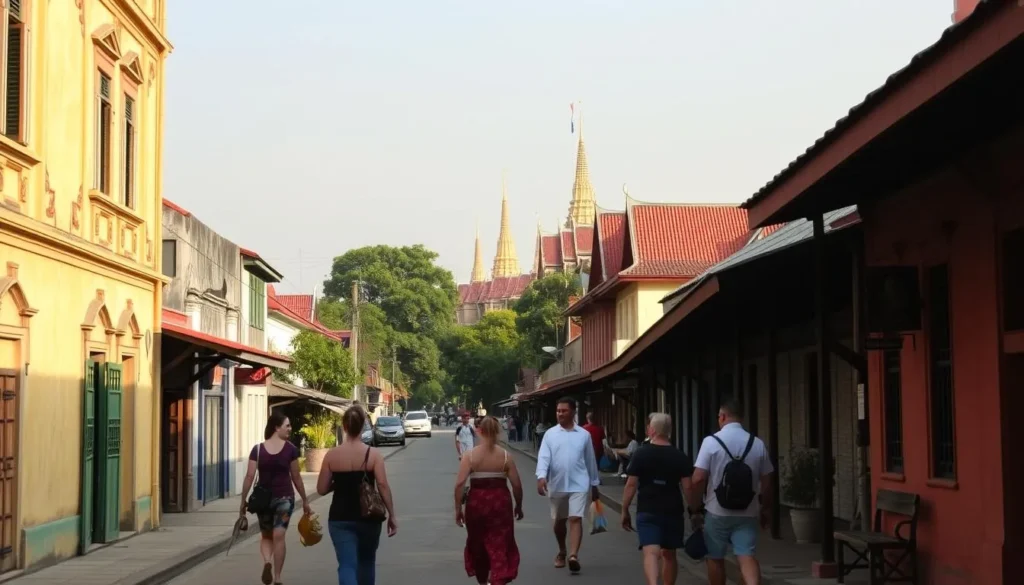
Recommended Accommodations
Battambang provides excellent value accommodations for all budgets. For a mid-range option, consider Bambu Battambang Hotel or Delux Villa Hotel, both offering swimming pools and comfortable rooms at around $30-50 per night. Budget travelers can find clean and comfortable guesthouses like Seasons Guesthouse for as little as $8-15 per night.
The best places to stay are near the Sangker River in the northern part of the city, offering easy access to restaurants, cafes, and main attractions.
Top Restaurants and Cafes
Battambang’s food scene is surprisingly diverse, with standout restaurants like Jaan Bai serving authentic Cambodian cuisine while supporting local social enterprises. For international cuisine, head to Flavors of India, where you’ll find huge portions at affordable prices.
For breakfast and coffee, The Caff by Battambang Fine Foods is a great spot, offering excellent pastries and Western breakfast options. Don’t miss trying local Khmer dishes like fish amok and lok lak at local restaurants, where meals typically cost $3-5 per person.
Conclusion
For those looking to venture off the beaten path in Cambodia, Battambang is a must-visit destination that promises an unforgettable experience. The city’s unique blend of colonial architecture, ancient temples, and rural charm makes it an ideal location for travelers seeking the best things to see in Cambodia.
Battambang offers a range of top things to do, from riding the famous bamboo train to exploring the surrounding countryside. With its compact size, you can experience the main attractions in just a few days, but you’re likely to stay longer to soak up the local culture.
The above is subject to change.
Check back often to TRAVEL.COM for the latest travel tips and deals.
